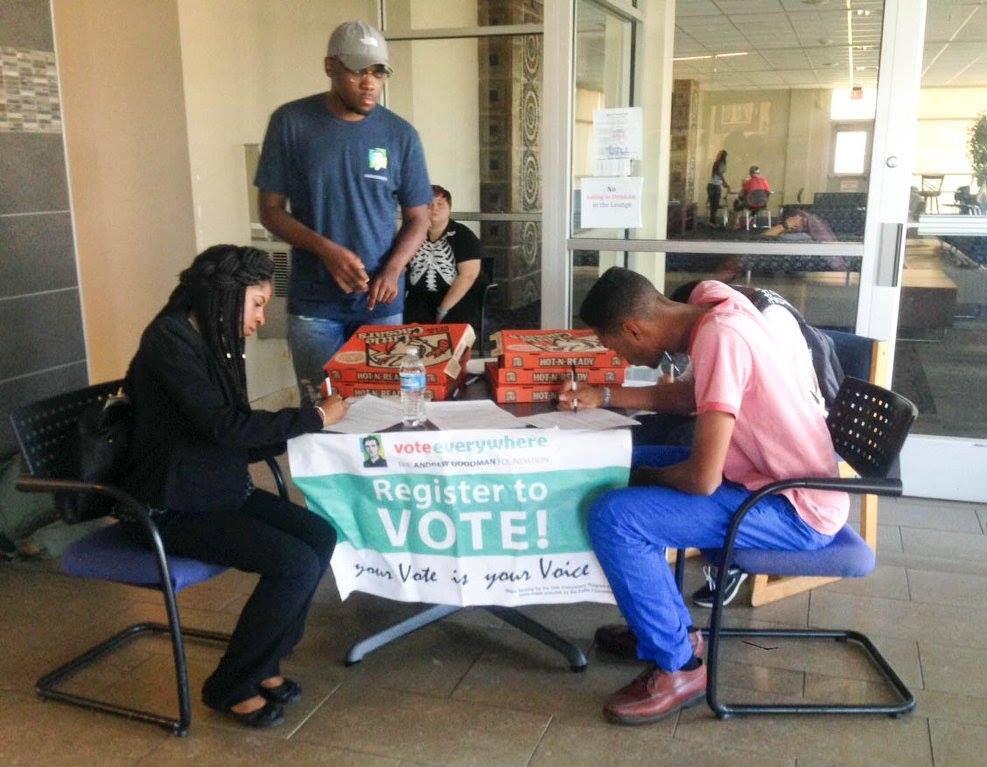
Support justice-driven, accurate and transparent news — make a quick donation to Truthout today!
Young people have the power to greatly impact the 2020 election. In many states, they showed this power in 2018, when youth voter turnout rose 16 percentage points from the previous midterm election, marking the highest level in midterm participation among youth in the past quarter century. In states like Tennessee — which has historically low youth voter turnout rates — young voters, and particularly young voters of color, were inspired to come out in record numbers.
This uptick in turnout came about thanks to the work of groups like the Equity Alliance and the Tennessee Black Voter Project, which registered massive numbers of young Black voters outside of churches, laundromats, and nightclubs. Meanwhile, campus organizers with groups like the Andrew Goodman Foundation made sure their classmates were registered at the state’s HBCUs and other colleges. In all, the groups registered over 91,000 new voters in the state.
But following this effort to engage young Black voters, Tennessee implemented new restrictions on voter registration drives.
In April, less than a year after the major voter registration push, Tennessee’s Republican-controlled legislature passed a bill penalizing organizations and individuals that turn in incomplete voter registration forms, and Gov. Bill Lee (R) signed it in May. Under the new law, Tennessee can fine groups that submit 100 or more voter registration forms missing a name, address, date of birth, declaration of eligibility, or signature. Penalties can reach $10,000 per county where violations occur if more than 500 incomplete forms are submitted. The law also bans out-of-state poll watchers.
The measure makes Tennessee the first state in the nation to threaten voter registration activists with civil penalties for submitting incomplete forms.
A coalition of advocacy groups including the state NAACP, Equity Alliance, Andrew Goodman Foundation, and Democracy Nashville-Democratic Communities sued over the law, calling it an onerous attack on activists that’s meant to keep new voters away from the polls. And earlier this month, the same coalition filed a motion seeking a preliminary injunction to prevent the law from going into effect as scheduled on Oct. 1.
“This law is an intentional and unconstitutional assault on voting rights,” David Goodman said in a statement announcing the injunction request. “It is designed to discourage organizations from registering voters by employing intimidation tactics and imposing vague and excessive barriers.”
Goodman serves as the president of the Andrew Goodman Foundation, which was named for his brother who was murdered 55 years ago along with James Chaney and Michael Schwerner while working to register disenfranchised Blacks in rural Mississippi during Freedom Summer. The foundation works to train a new generation of young voting rights activists and has a presence on dozens of campuses nationwide, including schools in Tennessee.
For example, organizers with the Andrew Goodman Foundation recently held a massive voter registration drive at Tennessee State University — the largest and only state-funded public HBCU in state — as students headed back to campus to begin the new school year.
Because a big part of the Andrew Goodman Foundation’s mission involves registering students to vote, it would be among those directly impacted by the new law, which is why it’s seeking an injunction. Yael Bromberg, the group’s chief counsel for voting rights, noted in an interview with Facing South that the controversial registration law “comes on the heels of all these regressive laws that are already in place in Tennessee.”
For example, Tennessee already has one of the strictest voter ID laws in the country. And while voters in the state can use a faculty ID as an acceptable form of identification at the polls, students can’t use their state-issued student ID. As a consequence of these barriers, Tennessee currently ranks 45th in voter registration and 49th in voter turnout.
Bromberg said that another concern about the Tennessee law is that it could inspire copycat bills in other states. Earlier this year, for instance, a bill was introduced in the Texas legislature that would have imposed criminal penalties on people who fill out a voter registration form improperly. However, it failed to pass.
“People are really looking at what is going to happen in Tennessee,” Bromberg said.
Trump is silencing political dissent. We appeal for your support.
Progressive nonprofits are the latest target caught in Trump’s crosshairs. With the aim of eliminating political opposition, Trump and his sycophants are working to curb government funding, constrain private foundations, and even cut tax-exempt status from organizations he dislikes.
We’re concerned, because Truthout is not immune to such bad-faith attacks.
We can only resist Trump’s attacks by cultivating a strong base of support. The right-wing mediasphere is funded comfortably by billionaire owners and venture capitalist philanthropists. At Truthout, we have you.
Our fundraising campaign is over, but we fell a bit short and still need your help. Please take a meaningful action in the fight against authoritarianism: make a one-time or monthly donation to Truthout. If you have the means, please dig deep.